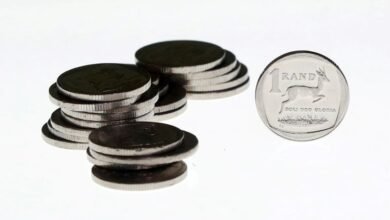Oliver Cookson launches supergreens business Verve Nutrition

When Oliver Cookson was in primary school most of his friends wanted to be an astronaut or a racing driver.
When he was asked to draw what he’d like to be, he said he wanted to build a business and employ lots of people.
Some 35 years later he’d done exactly that. His mum handed him back the drawing a few years after he sold his company, MyProtein, in a multimillion pound deal.
After a few years dabbling with various ventures and a fair dose of philanthropy, Cookson now wants to take on the supergreens industry.
Can he replicate the same success he had with MyProtein and be a British success story a second time round?
It all started in the playground
We meet in an upmarket Victorian hotel in Cheadle Hulme, near to where Cookson grew up and currently lives part-time.
The rest of the time he lives in Monaco ‘for the sunshine… and business advantages’. It is quite clear that while he might be a local boy, he has adjusted well to the high life with his designer clothes and flashy car.
While Cookson might now be used to the finer things in life, his upbringing wasn’t plain sailing.
His father, a second hand car salesman – ‘a bit of a wheeler dealer’ – and mother, a secretary at a pensions firm, separated when Cookson was young.
He and his mum had to start all over again, moving into a council flat with an electricity meter and no central heating.
‘I was away from my friends, isolated… not wearing the nicest of trainers. There’s worse poverty but I was certainly poor.
‘I remember thinking I want better than this but I didn’t know how to do that. That’s what instilled the drive within me and maybe some natural entrepreneurship.
‘I know it’s a bit of a cliche now [but] I used to buy and sell things at school.’
Starting MyProtein with a £500 overdraft
While Cookson might have been entrepreneurial in his teenage years, he struggled academically and left school at 16 with no GCSEs.
After school he spent six months ‘doing nothing’ until he saw a David Lloyd gym opening near his home.
‘I’d never been to a gym before and I thought it would give me a bit of focus and a bit of discipline. I was religious, going five times a week.’
From there, the natural progression was to start researching protein powder and supplements which, at this point, were for bodybuilders rather than casual gym-goers.
He had his ‘eureka moment’ in his mum’s kitchen.
‘I was looking at the whey protein I was using at the time and I didn’t even know what it was.
‘It was liquid gold, dairies were throwing it away.
‘I called them up and asked them how much natural raw whey protein was.
‘It was £3 a kg and the product I was using, which was 908 grams, was £30.
‘I thought £3/kilo with some flavouring you could sell it for £15 and still have a huge mark up,’ and the seeds of MyProtein were born.
Cookson was, by this point, a self-taught web developer, having learnt the ropes from his dad’s neighbour David at the age of 9.
It meant he was able to become the first person to put a branded protein product online.
‘If you want to create an e-commerce site now, there’s a few clicks and you’re done but there was nothing like that in 2003/4. I built the whole platform from the ground up on my own and in my spare time.’
While many founders might claim to be down to earth, he seems genuinely baffled as to how he managed to make it work: ‘I built the whole warehouse management system.
‘If I’m completely honest, I have no idea how I did that. I don’t think I could do it again.’
‘It was profitable after week one’
Before Cookson launched MyProtein, protein powder was predominantly sold in the likes of Holland & Barrett or even on eBay but it was ‘spit and sawdust’.
The market was nowhere near as saturated as it is now – it is estimated to be worth billions globally.
I never took a pound of investment or loan, it was completely bootstrapped
Despite being the first mover in the market, Cookson still had an uphill battle to climb.
Gym-goers tend to be more conscious than most of what they put into their body, so a challenger in the space offering half-price protein naturally brought scepticism.
Cookson chose to market to the hardcore bodybuilding market first, which helped launch MyProtein to its core demographic in a pre-influencer world.
‘My message to them was effectively, you’re buying a product designed for a 16 year old starting out, or a 20 year seasoned pro.
‘MyProtein is designed for you. We broke down every ingredient so they could buy it on its own or create a custom formula.’
‘I started it with £500, that’s the honest truth. It was my overdraft. It was profitable after week one and since then I never took a pound of investment or loan, it was completely bootstrapped.’
Cookson kept the team lean and hired his mum as chief blender after six months before adding operational staff to pack orders.
’16 hour days sound like a cliche… but I was doing everything from packing the orders to website to customer enquiries to new product development and marketing.’
He only hired middle managers a few years after, before adding a senior management team in 2009, five years after launch.
Sale to The Hut Group
There came a point though, when Cookson started to explore his options and looked at selling a minority stake to private equity before a possible full exit.
‘I hadn’t burnt out, there was no loss of passion but I had no security. The analogy I use is a fruit machine. If you keep on pressing that button you get jackpot, jackpot, jackpot. One day you might spin and lose your money.
‘One day something could have happened which was outside of my control, like a new law came into ban protein powders or something.
‘I thought, I want to change the legacy of the Cookson name and I can do this because I’ve got a hell of a lot of equity. If I can take some chips off the table and still keep some chips in, that’d be a wise move.’
It didn’t quite work like that though. In 2011 Cookson sold MyProtein in its entirety to The Hut Group (now THG) for £60million plus shares, which he admits wasn’t his first plan.
Some years later there was a court battle between Cookson and THG over the sale and the valuations that each side had attached to the business.
He doesn’t seem entirely comfortable with how MyProtein panned out.
‘Am I happy with the direction [MyProtein has taken]? When you reflect on things in life I think you always reflect on the best things… I try not to live with regrets.
‘You make those decisions in that moment and you’ve just got to live with it.’
While he was sitting pretty with millions in the bank, what he wasn’t prepared for was the ‘complete void’ that the sale left him.
‘I would have loved to have spoken to someone before I sold MyProtein because it was my life, my purpose was a complete void.
After a year of ‘kicking around’ he launched GoNutrition, which he now admits was a ‘knee-jerk reaction’ and a ‘mistake.’
‘I knew I was never going to be doing 16 hour days, but I knew I could add a lot of value. I wasn’t as fully invested in it, it was less than a part time job.’
He sold the company for a six-digit profit in 2019.
Life after a multimillion pound sale
Now Cookson thinks it’s time to move back into the nutrition game, but this time he wants to tackle the supergreens industry.
They’re the latest trend to take social media by storm, with influencers listing some spurious health claims.
Cookson launched Verve Nutrition at the end of 2023 with an 80 ingredient superblend. It seems an odd move for the entrepreneur who has tended to be ahead of the curve rather than joining in on trends.
It’s not even the first time he’s dabbled with greens powders, having launched one in 2008 with MyProtein.
He claims there will be a ‘unique element that will be pioneering’ which he will launch in time, but for now customers can just buy the 300g V80 blend – 30 servings – for £75.
The landscape for businesses has changed. While Cookson was at the forefront of ecommerce in 2004, it is easier than ever to set up online, whether that’s through Shopify or TikTok shop. It means more people can flog their own products. What does that mean for Cookson?
He thinks transparency is key to the success of Verve and he thinks he can shake up an industry that desperately needs to change.
Cookson claims 95 per cent of the proprietary blends offered by most companies will be full of filler and cheap products.
‘You’re getting a sprinkle [of the expensive ingredients] just to get the label claim and you’re getting absolutely no benefit whatsoever. For me that’s a con and that’s not okay. If I’m consuming a product thats supposed to be a health product, I want to know how much of everything I’m getting.
What I’ve done is turned it upside down – every single of the 80 active ingredients in Verve, we’ll tell you what’s in there. We don’t have anything to hide.’
Unlike his attempts at businesses after the MyProtein sale, it seems Cookson is raring to go and thinks he can make as big an impact on supergreens as MyProtein did for protein powder.
He has a lot more than a £500 overdraft behind him this time, but he also has a lot less to lose.
Some links in this article may be affiliate links. If you click on them we may earn a small commission. That helps us fund This Is Money, and keep it free to use. We do not write articles to promote products. We do not allow any commercial relationship to affect our editorial independence.
Source link





